#refugees evicted
Text
CE 1948, 05, 15: Palestinian Nakba (Catastophe)
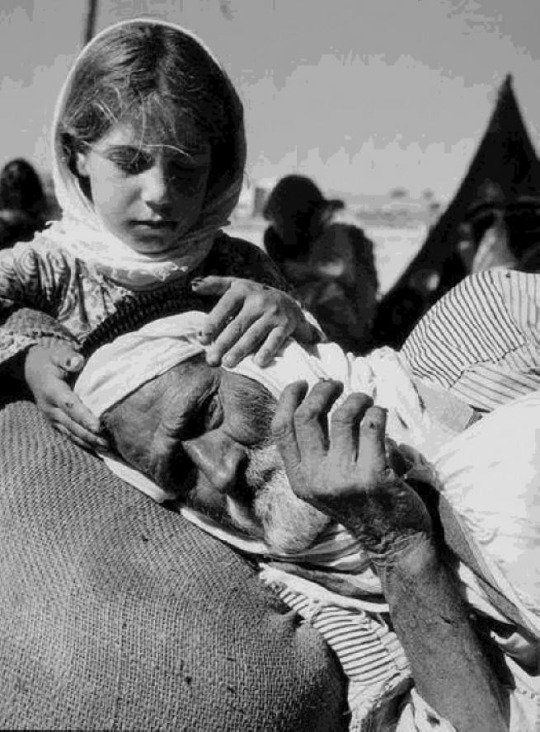
View On WordPress
0 notes
Text
quick palestine fact sheet:
there are nearly 7 million palestinian refugees globally
1.5 million individuals live in the 58 recognized palestine refugee camps around palestine (i.e. in gaza, syria, east jerusalem, etc) recognized by the unrwa
67% of gaza's population are refugees
there are 905,000 registered palestine refugee children: 635,000 in gaza and 269,000 in the west bank
palestinian refugees frequently cannot access public health insurance and are barred from many professions; some areas bar them from education and formal work
in gaza poverty rates are nearly 82% and the unemployment rate is some of the highest in the world at nearl 47% as of august 2022
one recent study showed that 88% of palestinian children show signs of war-related post traumatic stress disorder
37% of adults in the gaza strip qualify for diagnosis for ptsd; however, this number should be approached cautiously, accounting for preconceptions about mental health, access to diagnosis, and hermeneutic injustice: the number is likely far higher
48,000 people in gaza have some form of a disability: more than one fifth of this number are children
palestinians are not allowed, by israeli law, to have citizenship; they have no freedom of movement, and can be subject to forced evictions, detention, and torture.
the per capita gdp of palestine is US$3,678 as of december 2021; this is in comparison to a gdp per capita of USD$52,000 in israel
palestine does not have a formal military. the us stopped aid to palestine, around $60 million, in 2019. palestinian security services receives around $27 million from the national budget.
hamas, a separate entity from the pss, receives around $300 million per year. in comparison, israel spends in excess of USD$23.6 billion annually on their military.
in the midst of disinformation campaigns by global powers, fight facts with facts- and with protests, rallying, donating, elevating the voices of palestinians. keep showing up. keep educating yourself and others. never give up hope. palestine will be free.
567 notes
·
View notes
Text
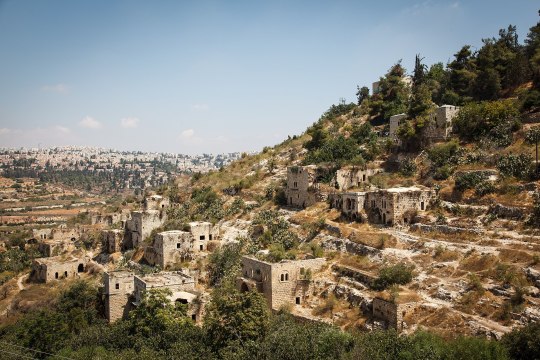
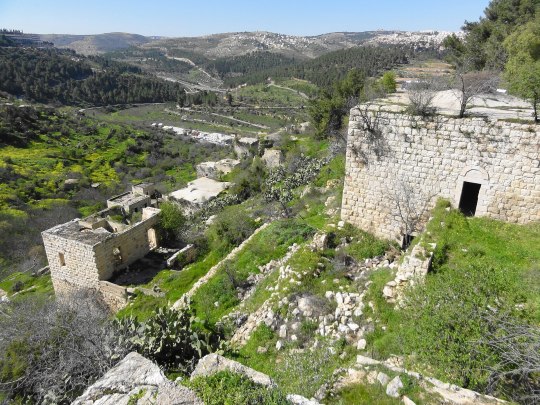
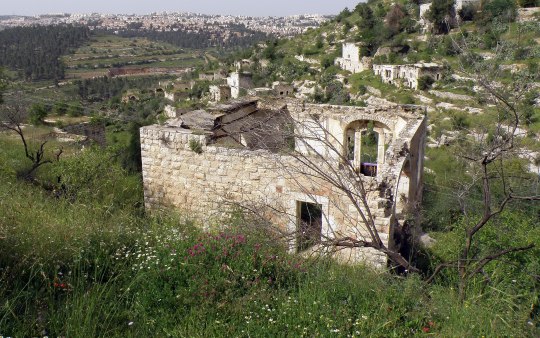
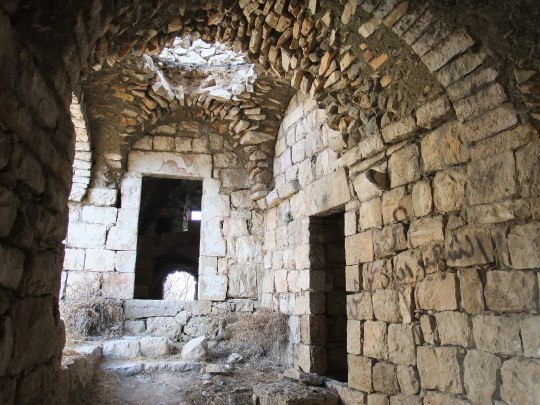
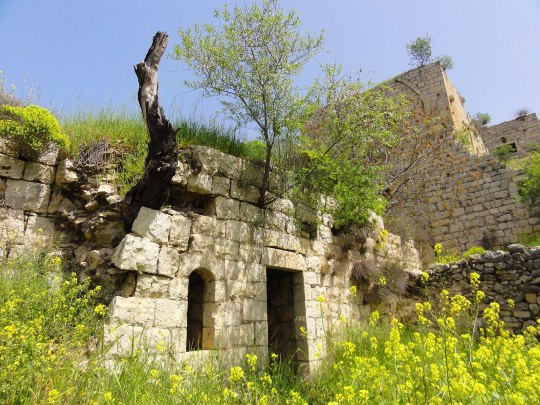
when the homes in the depopulated palestinian village of lifta were originally built is impossible to tell and most likely varies from house to house. the area's been known since ancient times, including having been written about in the hebrew bible. it's retained multiple different names throughout history - lifta by romans, nephto by byzantines, clepsta by crusaders, then lifta again by arabs. in more recent times, the area saw battle in the early 19th century, when it saw a peasant's revolt against egyptian conscription and taxation policies. (egyptian-ottoman ruler muhammad ali had attempted to become independent from the ottoman empire, and sought to use the area of "greater syria" which palestine was apart of as a buffer state.)
the village was predominantly muslim with a mosque, a maqām for local sage shaykh badr, a few shops, a social club, two coffee houses, and an elementary school which opened in 1945. its economy was based in farming - being a village of jerusalem, farmers would sell their produce in the city's markets. an olive press which remains in the village gives evidence to one of the most important crops its residents farmed. the historically wealthy village was known for its intricate embroidery and sewing, particularly of thob ghabani bridal dresses, which attracted buyers from across the levant.
lifta also represents one of the few palestinian villages in which the structures weren't totally or mostly decimated during the 1948 nakba. 60 of the 450 original houses remain intact. from zochrot's entry on lifta:

israel's absentee property law of 1950 permits the state to expropriate land and assets left behind, and denies palestinians the right to return to old homes or to reclaim their property. it's estimated that there's around 400,000 descendants of the village's original refugee population dispersed in east jerusalem, the west bank, jordan, and the palestinian diaspora.
like many depopulated palestinian houses, some of those in lifta were initially used to settle predominantly mizrahi immigrants and refugees, in this case 300 jewish families from yemen and kurdistan. the houses weren't registered in their names, and the area generally saw poor infrastructure and no resources including water and electricity provided by the government. most left in the early 1970s as a part of a compensation program to move out people who'd been settled in depopulated palestinian houses - if they didn't, they were referred to as "squatters" and evicted. (holes were even drilled in the roofs of evacuated buildings to make them less habitable). the 13 families which remain there today only managed to do so because they lived close to the edge of the village.
in 1987, the israeli nature reserves authority planned to restore the "long-abandoned village" and turn it into a natural history center which would "stress the jewish roots of the site", but nothing came of it. several more government proposals on what to do with the land had been brought up since then. this culminated in in 2021 when the israel land administration announced without informing the jerusalem municipal authorities that it issued a tender for the construction of a luxury neighborhood on the village's ruins, consisting of 259 villas, a hotel, and a mall. since 2023, they've agreed to shelve and "rethink" these plans after widespread objection.
the reasons for the objections varied significantly between the opposing israeli politicians - who see the village as an exemplar of cultural heritage and "frozen in time" model of palestinian villages before 1948 - and palestinians - who largely see the village as a witness of the nakba and a symbol of hope for their return. lifta is currently listed by unesco as a potential world heritage site, a designation netanyahu has threatened to remove several times.
many palestinians who are descendent from its former residents still live nearby. like with many other depopulated palestinian villages, they've never ceased to visit, organize tours of the village, and advocate for its preservation.
#palestine#info#nakba#my posts#the dresses link isnt specific to lifta thobs but provides a good overview#i couldn't find anything online abt lifta's embroidery but some of the book pdfs on palestinian costume i reblogged a while ago have info
381 notes
·
View notes
Text
>be me, drow bard
>have eldritch mind hijacker’s curse tadpole in brain that will kill me in like a week
>decide to take time out of day anyway to try and stop druids from evicting innocent tiefling refugees just because of who they are so that they don’t all die
>walk up to tiefling leader in the grove to ask what i can do to help
>”ew is that a fucking under elf”
>mfw
359 notes
·
View notes
Text
Zevlor's Helmite Oath
Zevlor was a Hellrider from Elturel and a paladin of Helm - the god of guardians - as you may already knew from the description of his "Hellrider's Pride" gaunlets. As someone who is not familiar with DnD lore, I did some digging to gain insight about the nature of Zevlor's oath and the circumstance around his oathbreaking. Might as well share what I found :)
Helm is a lawful neutral deity, whose principle can be seen as cold and rigid as he favors one's sense of duty and commitment as a protector, guardian and defender above all else. The dogma of Helm's faithfuls can be sum up as follows:
Guard perfectly, attentively, and with forethought; be ever vigilant. Guard what you are ordered to guard, including that on which your charge depends.
CREED OF THE HELMITE FAITH.
I was not surprised to learn Elturel was home to the strongest Helmite Church in the North. With the famous Hellrider as the citywatch and its strict rulings, Elturel is known to be the most efficient, secured and well-policed city in the region. It's natural for Hellrider to be among Helm's faithful, and I can imagine their paladin's oath is to safe-guard the city and its citizen to their last breath.
I'm not sure in BG3 timeline if the tieflings were forcefully evicted from Elturel, or if they left on their own accord to avoid violence and bigotry against their kind. But either case, Zevlor most likely broke his oath for simply leaving Elturel to lead and protect the tiefling refugees.
In principal, the church of Helm is to welcome whomever come seek their protection, even criminals. However, it's also their duty to turn them in to law enforcement if required, and see their trial to proceed fairly. That means, when the tieflings were deemed as a dangerous minority in the eyes of Elturian, Zevlor and fellow Hellrider must abide to the laws determined for them, or resist and face the repercussion:
All true warriors of Elturel were most likely Hellriders. Those who resigned were stripped of their gear, exiled from the city, and named a heretic in the eyes of Helm for abandoning their post.
Taken that Zevlor still had his gaunlets and his sword, I'm convinced he helped the refugee leave the city in secret. He sentimentally kept the gauntlet out of all the parts from his Hellrider plated armour, because you guess what? A silver gauntlet with eye is Helm's holy symbol. This proved he still held onto the Helmite failth, despite being stripped of the God's divine grace for his moral decision. He owned his choice by leaving the rest behind along with his title, but still took it upon himself to be the guardian of his people. That's why when you came along and protected them from the goblin, which allowed them to travel to Baldur's Gate, the Hellrider's Pride became yours. As for Zevlor, it seems to me he was ready to truly rest, which shows in his conversation with Tilly, too.
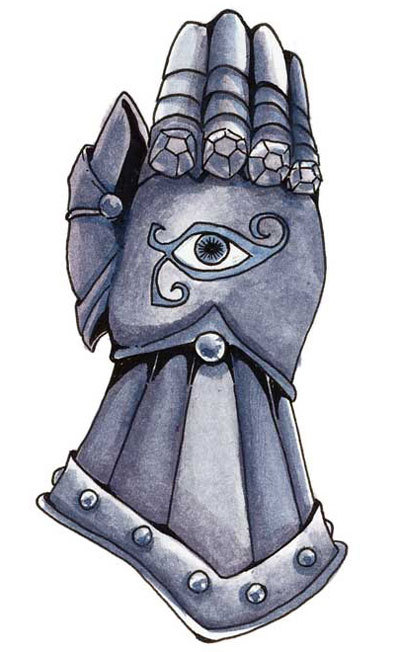
In Act 2, we see Zevlor seeking to restore his oath and fell victim to the Absolute; this is not the sign of him wanting to taste the glory again, but simply because the journey through Shadowcurse land has proven to be overwhelmingly dangerous. Zevlor might have viewed himself as a liability, not only due of his old age, but also his lack of dark vision despite being a tiefling. I believe whatever the watchful Helm bestowed on paladin Zevlor back in the day must have compensated nicely for his lacks. And ironically, with the innate darkvision that allows for better guard, the tiefling Hellrider were supposed to be valuable members in their unit. Until Elturian decided those with infernal heritage are somehow a threat to their hypervigilant society.
87 notes
·
View notes
Text
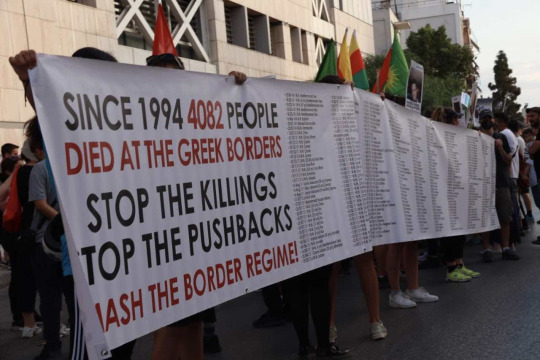
Regarding the Eviction of the Self-Organized Refugee Camp in Lavrio, Greece
On July 5, 2023, the Greek government evicted a Kurdish refugee camp in Lavrio, Greece. The camp had existed for many decades, serving as an important center of organizing in southeastern Europe. Turkeys’ war on Kurdish people, the Greek government’s war on autonomous spaces, and the European Union’s war on migrants all intersect in this operation.
In this analysis, Beja Protner shows the connections between the different forms of systematic oppression involved.
247 notes
·
View notes
Text
Author Spotlight: Talia Bhatt
We're excited to highlight Talia Bhatt, author of the current club read Dulhaniyaa. Read on to hear how her identity and experiences informed her writing, and how queer love is a jailbreak.

“Desi trans lesbian” feels, sometimes, like an ephemeral identity.
I am situated nowhere transhistorically and barely transculturally, having to borrow the language, social trappings, and forms of identification of the nation(s) that colonized and impoverished mine to even express my embodiment and positionality coherently. In a world where Afsaneh Najmabadi can pose the question “Is any one of you a lesbian?” to a room full of Iranian transsexual women and get blank stares, as she relates in Professing Selves, or where Deepa Mehta notes in her groundbreaking lesbian romance Fire that Hindi lacks even a word to express the concept of a woman loving another intimately, romantically, carnally, I am unmoored and unfixed, an anomaly because I dare to imagine my transsexuality independent from men.
“Woman are for men”, assumes every culture with harsh patriarchal contradictions—which does not entirely exclude the West—and trans women doubly so, since the abhorrence of non-heterosexual modes of living and social organization leads many from cultures like mine to presume that a woman would only transition to be with a man. A profound loneliness dogs my very existence, alerting me to the wispy shadows of a shrouded past that barely had a record of women like me prior to the midpoint of the 20th Century, only whispers and rumors and sensationalist gossip scrawled in academic journal by Esther Newton, alluding to the idea of a “man” that, having availed of hormones and surgical interventions, now sleeps with lesbians—the scandal.
No ancestors that are mine to claim.
Dulhaniyaa is not a particularly melancholy book, though a certain pensiveness pervades the opening chapters. There a story within the story written in subtext, in allusions and word choices and snippets of dialogue, that Esha and Billu and Dolly and others are aware of: my homeland, my motherland, my culture and my nation and my state—it is not a place for queer women. It is certainly, emphatically, not a place for a trans woman who fancies herself still attracted to other women, or even indelibly non-binary in a way. Women like us have no names, no pasts, and almost certainly no futures within the narrow confines of the constructed and stifling heterosexual hegemony.
A reviewer was kind enough to sum up Dulhaniyaa for me better than I ever could, stating triumphantly that “Queer love is a jailbreak.” It’s a quote that has stuck with me both for how simply it states a core theme that I certainly labored to convey without necessarily consciously meaning to, as well as for how profoundly vast and unencompassable the prison I find myself in is. My shackles are Time and Language itself, my cell the land I was born in, my wardens its people. I am a refugee in a sense that many, many queer and especially trans people tend to be, evicted and disowned and erased from hearth and homeland.
I wrote Dulhaniyaa because someone broke me out of that cell. She saw the woman I was as well as the woman I could be, and helped me bridge the gap between the two. She is now my wife.
Queer love is a jailbreak. Get your pickaxes ready.
#wlw books#booklr#lgbt books#contemporary#book recs#sapphic books#diverse books#desi#bollywood#trans author#guest post
33 notes
·
View notes
Text
Forcefully evicted Palestinian girl cries as she leaves home
#palestine#free palestine#gaza#free gaza#israel#gaza strip#genocide#current events#israel is a terrorist state#important
40 notes
·
View notes
Text
CE 1977: Jerusalem is occupied, West Bank and Gaza has gained 45 Israeli settlements
By this time, Israel has built 45 settlements in the occupied West Bank and Gaza and has completely occupied Jerusalem.
Following Israel’s annexation of East Jerusalem, the Israeli authorities gradually applied the Absentees’ Property Law to further the dispossession of Palestinian land and refugee property in the city.
In 1968, the Israeli State Attorney issued a guideline to the Israeli…
View On WordPress
0 notes
Text
Solidarity among the Displaced
How Russian Anarchists in Exile Supported Armenian Refugee Squatters
(2023-09-19)
Throughout the world, mass displacement is accelerating as climate catastrophe, economic crisis, and war drive millions into exile, both within their own countries and across borders. These mass migrations are exacerbating gentrification, driving up housing costs just as real estate speculation is rendering more and more people homeless. How can displaced people continue to take political action in their new homes, establishing solidarity across ethnic lines in unfamiliar settings? In Armenia, Russian anarchists living in exile set one example, supporting Armenian refugees who had squatted the abandoned Ministry of Defense.
(...)
In the last decade, Yerevan saw several waves of protests. Do you see people building historical knowledge and experience from one struggle to the next?
With regards to the movement of the 2010s in Yerevan, there really was a street movement in which Armenian anarchists participated. There were protests against the increase in electricity prices, an anarchist bloc participated in a demonstration on human rights day, there was an action against the gentrification of Yerevan, and an action of anarcho-feminists. But unfortunately, all of the people from that generation have either left politics, joined political parties, or gone abroad to Russia or Europe.
Today, the anarchists in Armenia are mostly emigrants from the Russian Federation. In fact, I only know two Armenian anarchists: N—, a punk musician (who became an anarchist in the early 2020s), and S—, an anarcho-feminist who lectures in our space and occasionally publishes in left-wing and anarchist magazines (who also became anarchist around that time). Neither them, alas, was connected to the movements and affinity groups of the 2010s.
There is also an anarchist from Israel: Y—, a Jewish woman who gave birth in the Crimea, repatriated to Israel, lived there for 18 years in kibbutzim and participated in the anarchist movement there (including contact with “Anarchists Against the Wall”), married an Armenian and moved to Yerevan, and decided to establish a café here with anarchist and feminist themes. The café became a gathering place for the local Jewish community (for example, at Shabbat celebrations every Saturday), as well as for the creative intelligentsia, who held public readings there.
All this continued until Russia invaded Ukraine, after which the Russian authorities began to persecute their citizens even more, and hundreds of thousands of anti-war Russians (including anarchists) fled the country.
As a result, Armenia, which was mono-ethnic for almost all the years of its independence, is now more diverse.
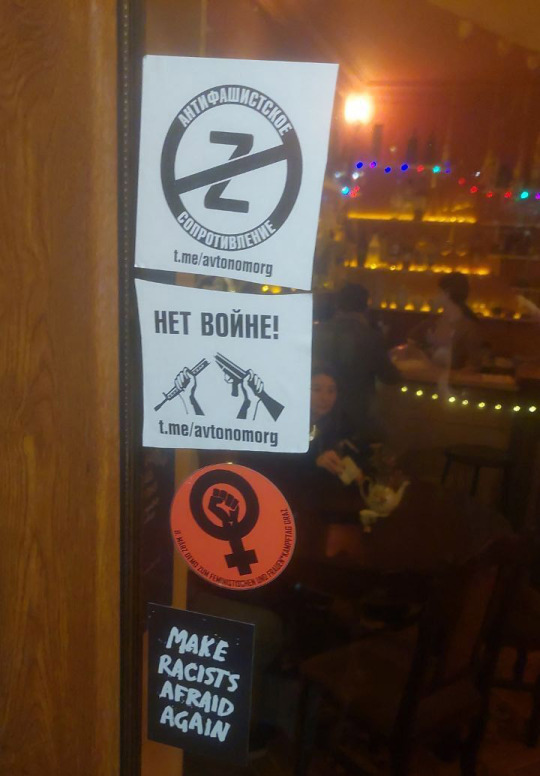
The door of the Mama-jan café. The second sticker says “No war” in Russian.
That is how our small circle was formed, which now represents the entire anarchist movement in Armenia.
There are many different people among us. One is actively involved in veganism and even founded his own vegan cooperative (which I also joined). Others, like one friend who is a Christian anarchist, collect humanitarian aid for the victims of the war. There is a queer anarchist group that continues to engage in street activism.
How did you go about supporting the squatters?
As soon as we learned that they had been forcibly evicted, we decided to go and help them. We went to them several times and, despite some initial distrust, my friends managed to find a common language with them.
As a result, at the next weekly meeting, we discussed how to go about supporting them. One of the sympathizers of anarchist ideas, a visitor to our circle, arranged to supply firewood for using potbelly stoves to heat their tents. Also, as an anti-war activist with certain connections, I managed to invite a journalist friend there. During a subsequent visit, they met us very hospitably. We helped to unload the firewood and they fed us and taught us to play backgammon.
We made a report about the situation for emigrant Russian-language media, which later played a very important role. We also established contact with the charitable organization “Ethos,” which was founded by relocators in Yerevan and is engaged in helping both Ukrainian and Armenian refugees.
Thanks to the fact that news coverage appeared about the eviction and was reposted on our initiative via various publishing houses (for example, in “Doxa,” which actively covered the persecution of anarchists and anti-war protesters), we were able to initiate a collection for food, medicine, and fuel in Ethos. In the end, we collected 60,000 drams more than planned! [The equivalent of approximately $157, still a significant amount of money for some refugees in Armenia.]
Also, the squatters began to actively invite us to their protests: they held these every Thursday and every Monday near the government building and the State Expenditure Committee. My friends and I held a poster reading “State, why did you take away people’s housing” with anarchist symbols.
The squatters were very pleased with our support, and even invited us to barbecues—which was especially ironic in the case of our vegan friend.
What do anarchists have to offer to struggles for housing?
Anarchism, in principle, throughout its history, has been very interested in the housing issue. It is not for nothing that during the Paris Commune, one of the revolutionary decisions of the council was to settle homeless Parisians in the apartments of bourgeois emigrants who had fled to Versailles, and to establish a ban on evicting tenants for non-payment of rent. Housing insecurity is a significant aspect of modern society, a challenge to which anarchists must respond.
The example of this eviction is particularly striking. It shines a light on all the absurdity and immorality of a civilization based on private property.
_
The house was not built by its owner. It was erected, decorated, and furnished by innumerable workers—in the timber yard, the brick field, and the workshop, toiling for dear life at a minimum wage…
Who, then, can appropriate to himself the tiniest plot of ground, or the meanest building, without committing a flagrant injustice? Who, then, has the right to sell to any bidder the smallest portion of the common heritage?
On that point, as we have said, the workers are agreed. The idea of free dwellings showed its existence very plainly during the siege of Paris, when the cry was for an abatement pure and simple of the terms demanded by the landlords. It appeared again during the Commune of 1871, when the Paris workmen expected the Communal Council to decide boldly on the abolition of rent. And when the New Revolution comes, it will be the first question with which the poor will concern themselves.
Whether in time of revolution or in time of peace, the worker must be housed somehow or other; he must have some sort of roof over his head. But, however tumble-down and squalid your dwelling may be, there is always a landlord who can evict you…
Refusing uniforms and badges–those outward signs of authority and servitude–and remaining people among the people, the earnest revolutionists will work side by side with the masses, that the abolition of rent, the expropriation of houses, may become an accomplished fact. They will prepare the ground and encourage ideas to grow in this direction; and when the fruit of their labours is ripe, the people will proceed to expropriate the houses without giving heed to the theories which will certainly be thrust in their way–theories about paying compensation to landlords, and finding first the necessary funds.
On the day that the expropriation of houses takes place, on that day, the exploited workers will have realized that the new times have come, that Labour will no longer have to bear the yoke of the rich and powerful, that Equality has been openly proclaimed, that this Revolution is a real fact, and not a theatrical make-believe, like so many others preceding it.
-Peter Kropotkin, The Conquest of Bread
63 notes
·
View notes
Note
There are… strange things happening to my body. I heard from some of my friends that I should come to you for things like this. Sorry if it’s a bit oddly worded, I’ve had to rewrite this quite a bit.
You see, I’m used to having the ocasional astral spell, leaving my body from time to time while I nap and waking up an hour or so later to find my body right where I’ve left it. But recently, these spells have been getting quite a bit longer. And someone has seen fit to move into my body while I’m out.
I’ve heard of this sort of thing before, shared vessels and all that. But I never asked for a bodymate, let alone gave them permission! You see, my new bodymate is a refugee from their dimension. They jumped into my body since it was the first they could find unoccupied at the time, and apparently it’s rather similar to the one they used to have at home. I’ve left notes around, and they’ve written back, and for a while we had a somewhat tedious agreement over who could control the body when. I control it during the daytime, and them at night, simple as that. We both take frequent naps as our schedule allows, so our body doesn’t get too exhausted.
However recently, they’ve been a bit of a “controller-hog”, so to speak. I’ll settle down for a nap in my bed, only to wake up on the couch watching some bad medical drama. I hate medical dramas. But the worst thing by far was when I woke up three days ago with blue hair. Blue HAIR. My hair has never been blue, nor have I ever dyed it, or even had hair dye in my home!
I immediately wrote several very stern letters to my bodymate. I had hoped that maybe over the next few nights, we could have hashed something out together. But today I woke up with a NOSE RING. What’s next? Some cheap tattoo?!
I’ve tried writing this letter SO MANY TIMES, but each time I’ve been “dozing off” and waking up with my finger pressed conveniently to the backspace button. I’ve tried so hard to get them to leave, but they simply refuse. What do I do?!
Reader, this is absolutely appalling behaviour. It is never acceptable for a bodymate to make changes to the shared vessel without the permission of all inhabitants, and their blatant disregard for your wishes proves them to be as unscrupulous as they are rude.
The fact this person is a refugee from another dimension does not give them the right to treat your shared body with impunity. Quite apart from the violations of changing the body's appearance without your agreement, there are the very real health risks involved.
After all, if your body doesn't get enough rest because one of its occupants sees fit to sit up watching medical dramas, you will both suffer the physical consequences.
Usually I am the first to advocate for communication and compromise. But in this situation, I think your bodymate has shown they are not interested in negotiation. The time for rationality and reason has passed. You must take direct action.
There are two options available. If you are not particularly attached to the body itself, you could always cede possession and take up residence in another vessel.
Many people consider such a change to be a refreshing change of perspective. You might choose a vessel at random, find a volunteer online, or indulge in having a custom body created for you by a professional matter consultant.
Just be sure to update your identity documents and paperwork before making the jump. There are ways to prove your identity in the case of corporeal eviction and so on, but it can be a lengthy and uncomfortable process and is far best avoided.
Alternatively, if you have a particular affection for this vessel, I'm afraid you're going to have to put your foot down. At a time when you are in full control of the body, speak to a trusted friend and establish a way of communicating to them whether or not the person in control of the body really is you. A code word will do, or a reference to a shared memory. Anything your new bodymate will be unable to guess.
Then, you need to call in the professionals. Exorcism has an understandably poor reputation in the community, but it remains the most effective way to handle unwanted guests.
Find a licensed practitioner to perform the ritual, and book them for a time and place of your choosing. You'll also need to give them the contact details of your trusted contact, to check whether the ritual was successful or not.
Finally, at the allotted time, tell your bodymate that you are ready and willing to take drastic measures to protect your boundaries. There is a chance they will take your threat seriously, and agree to either vacate your body of their own volition or to treat your shared space with more respect.
Given their behaviour during the writing of this letter, however, I think it far more likely they will respond with aggression. Brace yourself. They will very probably try to wrest control of the body and suppress your influence entirely. Let them – your exorcist will be on hand to manage the situation.
Once your bodymate has been safely transferred into temporary storage, the rest is up to you. The most ethical choice is to find a willing alternative vessel and having your bodymate transferred to them as soon as possible. Alternatively, safe release into a crowded public area is often included in the price of an exorcism, with a small surcharge if you want to choose the target area yourself.
Banishment to another realm entirely will cost significantly more. Besides, even without the concerns about keeping them from accidentally going back to the realm they just left, crossplanar banishment is considered rather gauche.
You don't need to decide right away. Once your headmate is removed, they will be able to remain in the storage container for up to a week with no harmful effects. It will be rather boring for them, but frankly I'm inclined to think they deserve a little time to sit on the mantelpiece and think about what they've done.
32 notes
·
View notes
Note
Going Anonymous for security reasons here. So, regarding Kashmir: I am sick and tired of how people on Tumblr (or rather Hindublr tags) really believe that Kashmir is healing when it is still the most armed state in the world. I am horrified of how these people glorifying Army personels, who are no more than paid abusers and rapists and this is coming from a person whose family legacy is that of 'serving in the Army' I am not Kashmiri (And I cannot say I have faced the same shit they faced and I commend their resilience and their spirit) but I've had the chance to visit the 'non tourist' spots and let me tell you, it is fucked up. Even from the perspective of a person who is very privileged in this situation. I've literally seen some of these 'brave sons of India' beat up a seven year old boy just because he was 'being a hindrance in the road' One of my dad's colleague just got a 'warning' even after being a convicted assaulter after he raped two Kashmiri women (And this was back in 2013) and I came to know about this through Twitter out of all things. I remember going through those small towns in Kashmir and it being fucking empty and everything being closed up because they were afraid of the people who were stationed to 'protect' them. I am so sorry for venting out on your inbox like this but I've seen some of these blogs defend the Militarisation in Kashmir and it is awful and inhumane of how these people could even defend that out of all things. And to burst their bubble of delusion, it has gotten worse after the bill was passed. So many Kashmiri Muslims are getting wrongfully evicted out of their homes to 'house' the Pandits (but doing nothing when they were living as refugees and in destitution in Jammu) and the internet ban during the pandemic and people think Kashmir is healing?
And most of all, I wanted to thank you for posting the masterlist about Kashmir. It is very informative and has helped me learn and unlearn a lot of Kashmiri history.
This isn't even the first time the Army has done something like this. The IPKF was responsible for the massacres and rapes of multiple Tamil civilians it's insane how dedicated we are to glorifying the Indian military
#i know someone whose family legacy is also “serving in the army.” he wants to get in too...#anyways i'm glad you learnt something from that post nonnie!#asks#anon
22 notes
·
View notes
Text
by Michael Rubin
Rep. Alexandria Ocasio-Cortez (D-NY), New York's millennial congresswoman, believes herself the barometer of progressive morality. But by reframing Jesus as akin to Palestinian terrorists fighting Israel, she instead cloaks herself in a mantle of ignorance and moral confusion.
Conflating political and religious fervor, AOC took to Instagram on Christmas Eve to opine, "In the story of Christmas, Christ was born in modern-day Palestine under the threat of a government engaged in the mass genocide of innocents. He was part of a targeted population being indiscriminately killed to protect an unjust leader's power," she wrote. "Thousands of years later, right-wing forces are violently occupying Bethlehem as similar stories unfold for today's Palestinians, so much so that the Christian community in Bethlehem has canceled this year's Christmas Eve celebrations."
"The entire story of Christmas and Christ himself is about standing with the poor and powerless, the marginalized and maligned, the refugees and immigrants, the outcast and misunderstood, without exception," she added.
Where to begin?
Christians have little say about whether Bethlehem holds Christmas celebrations. In 1950, Christians made up approximately 86% of the population of Bethlehem and its surrounding villages. That share of the population stayed relatively steady until Israel handed the Palestinian Authority control over Bethlehem, and then the proportion of Christians plummeted. Today, barely 13% of Bethlehem's residents are Christian. At issue was the Palestinian Authority's deep discrimination against Christians. When Muslim families moved to Bethlehem and forcibly took over Christian property, for example, the Palestinian Authority did nothing to evict the Islamist squatters, even when judges sided with the Christians.
Palestinian terrorists in Bethlehem developed the tactics that Hamas later applied in Gaza. In 2002, for example, Palestinian terrorists seized the Church of the Nativity, barricading themselves in the holy site and stealing the priests' and nuns' food and water. They essentially sought to use the sensitive, civilian site as a shield to wage war. The Palestinian gunmen desecrated the church during the six-week siege. An Israeli sniper killed one, a most-wanted terrorist, after he began firing an automatic weapon from within the church. Terrorists then set fire to a neighboring building. The siege ended after six weeks with the evacuation of some terrorists to Gaza and the remainders to Europe.
Christians in Gaza fared even worse under Hamas. Just like the Islamic State in Iraq and Syria, Hamas imposed its extremist interpretations on Christians. It forced women to veil, banned alcohol, and sought forcibly to convert children. While Islamist propagandists note that Islam, unlike Judaism, considers Jesus a prophet, they punish Christians who suggest Jesus to be the son of God who died for mankind's sins. In 2006, 5,000 Christians lived in Gaza. Within a decade, that number declined by 80%.
Put aside her whitewashing of terror. AOC and her fellow travelers lack basic understanding of history. Jews were the indigenous population of the territory Romans renamed Palestine. Jesus was born a Jew, his last supper was a Passover Seder, and he died a Jew. Therefore, when progressive pundit Cenk Uygur posts, "If Jesus returned to the place of his birth, could he survive the night? Or would he be just another Palestinian casualty?" he is half right. Should Jesus reappear today in Bethlehem, he likely would not survive the night because, as a Jew, he would be subject to Palestinian lynching.
If AOC truly understood Christianity, she would realize that Jesus would not stand for the rape of girls and women, or the beheading and burning of children. Jesus preached love and compassion, not hostage-taking and terror. She would pray for the release of hostages and the end to terror, not peace under Hamas's yoke. If AOC understood history, she would realize Israel is the nation of migrants and refugees. While Jews are indigenous and always lived in the territory, it was the slaughter of Jews in Europe and the mass expulsion of Jews in Arab lands that led to a population influx, and that many Palestinians migrated from Syria as Jews transformed the land.
Politics should never trump principle. Unfortunately, for AOC they do. Embrace of Hamas principles condemns Jews, Christians, and moderate Muslims to pay the price.
28 notes
·
View notes
Text
How MK can be Latino and Jewish: A Guide for Fanfic Writers and RPs
Thank you to @fdelopera for help me with this post
This is my headcanon (the canon in the Usaigi Fanfic Universe) and you're welcome to adapt it for your own works of fiction. Of course, this is not the only explanation and you are free to headcanon however you’d like* ** This is a long post but please read and reblog.
*as long as you’re NOT perpetrating antisemitic and/or racist rhetoric
**if you do use mine I'll be over the moon and would love to read it. Also credit is nice
In honor of Oscar Isaac’s actual ethnicity(Guatemalan-Cuban) and to stay semi-realistic to actual history, in my hc Elias’s family is mostly Sephardic and Ashkenazi Jewish from Cuba who left Cuba during the Cuban revolution. Wendy’s family is Ladino(a term in Guatemala for someone who is multiracial with a mix of indigenous and European ancestry. Mestizo in other countries) with Mayan and converso (Sephardic/Crypto) ancestry. Oscar Isaac, in real life, is also Crypto-Jewish (literally, “Hidden-Jewish”) on his father’s side, making him Patrilineal Jewish by descent. His father’s family are descended from Converso Jews who were evicted from Spain in the 1500s.
Nitpicking Other Fandom Explanations/HCs
I’ve read some fanfics where Wendy is Latina and Elias a non-Latino jew. I personally prefer my explanation because the actor who plays Elias is also Latino. And, (to me) having Wendy be the Latina convert and Elias the (American) Jew plays into the idea that people from Latin America can’t be Jewish, so I personally don’t vibe with that headcanon.
Both before and during WWII, there was a wave of Jewish refugees who sought asylum in Latin America. I’ve seen other fans suggest that the Spectors could be the descent of these refugees who settled in Argentinian (or another South American country that took in refugees) because “Spector” is an Ashkenazi last name and proceed to imply that they would not be “Latino” by blood.
Firstly, I’d like to point out that there is no such thing as being “Latino by blood.” In the same sense that you cannot be Canadian or American by blood. First Nations and Native Americans are the only ones able to make that claim but their history and culture existed before the land was called Canada or America. They are Inuit/Navajo/etc by blood, not really Canadian/American by blood. It’s a European idea. “Latino” similarly, is a European word used to describe an ethnicity; it is not a race. (x) So even if the Spectors left Poland/Russia/Europe in 1930s, settled in Argentina, and some generations later MK was born, MK would still be Latino.
Secondly, while you don’t need to follow my headcanon, if you choose to make Elias 100% ethnically European Jewish(white), I would still encourage you to make Wendy indigenous/multiracial. By making both sides of the family descendants of Jewish refugees from Europe, you’re whitewashing MK. Oscar Isaac is a POC actor, let his character also be POC. Don’t just make the character Latino, let them be brown.
ok back to me~
On Elias
“The majority of Cuban Jews are descended from European Jews who immigrated in the early 20th century. More than 24,000 Jews lived in Cuba in 1924, and still more immigrated to the country in the 1930s. Following the 1959 communist revolution, 94% of the country's Jews emigrated, most of them to the United States.” (x)
For Elias and his side of the family, him being Cuban makes sense. He could be the descendant of those who left Spain, Turkey, and Eastern Europe due to persecution and intermarried with non-Jewish Tainos/mestizos. Elias would still be Jewish but also have some indigenous ancestry as well. If Elias was in his 20s when he had Marc, his family could have left Cuba in 1959 along with most other Jews and resettled in the States.
Further reading on Jewish Cubans: https://www.jewishvirtuallibrary.org/cuba-virtual-jewish-history-tour
On Wendy
In my head, Wendy is Ladino with Mayan, European, and conversa(Jews forced to convert to Catholicism) ancestry.
Assuming that Wendy was also in her 20s when she had Marc, she’d have been born and lived through the Guatemalan Civil War/Genocide (1960-1996). For context, with the support of the United States government, the Guatemalan government committed genocide against the Mayan population as well as widespread human rights violations against civilians. Wendy could have immigrated to the US when she was a teenager like many Latine children did (and still do) in order to escape the violence and war. Then, she could have converted back to Judaism, married Elias, then proceed to have Marc and Randall.
How would the MK System be considered Jewish if Wendy were not raised Jewish, and converted in adulthood?
(by fdelopera)
Most major Jewish denominations in the US will recognize a child as Jewish if the mother converts before marriage. These denominations include Reform (Ashkenazi denomination from Germany), Conservative (Ashkenazi denomination from Russia), and Reconstructionist (Ashkenazi denomination from the United States).
Nowadays, some Orthodox congregations also allow women to convert who weren't raised Jewish, and consider the children to be Jewish, so long as the conversion takes place prior to marriage. (Ultra-Orthodox congregations are still strict about this.)
However, in the 1980s when MK was born, this was not normally the case. In Orthodox communities, it would be unlikely for children to be considered Jewish if the mother was not born Jewish, and there was much less awareness of Crypto-Jewish people from Latam.
There is a "relatively" large Latine Jewish population in Chicago (relative to other Midwestern cities, at least), and because of this, there are several Sephardic synagogues in the Chicago area. The Spectors might have considered joining one of these synagogues as a family. Perhaps Elias grew up in one. However, Sephardic synagogues tend to be nondenominational Orthodox, and as such, they would have been more strict about conversion. It is possible that they would have prevented Wendy from converting, and they might have gatekept Marc and Roro from their Judaism.
Wendy might have decided to convert Reform, since a Reform congregation would recognize her Jewish heritage, and therefore her conversion process would be much easier. Elias might have left his childhood synagogue and followed Wendy to a Reform Temple. (In the show, the Spectors are coded as Reform Jewish, and so this HC works.)
However, Reform congregations were not as used to Latino members in the 1980s and 90s, and so the Spectors would likely have encountered racism in these communities, even though the Reform congregations would have recognized Wendy as Jewish, and made it relatively easy for her to convert.
So, the family would have experienced possibly less racism in Sephardic synagogues in Chicago, but Wendy might not have been welcomed. They would have been accepted as Jews in the Reform Temples in Chicago, but they likely would have experienced racism.
So, it's another instance of the family being outsiders in their own communities, further marginalizing them. And by extension, marginalizing the MK System and making it difficult for them to participate in both Jewish and Latine communities.
What does this mean for MK system (and by extension Randall)?
The Spectors would likely have been the black sheep in their community.
Not really fitting in with the Jewish community (since they’re Latino) and not really fitting in with the Latino community (since they’re Jewish). They are Jewish, they are Latino, but not in “the right way.” While I feel like this is important to keep in mind, I would suggest not writing about this particular subject (“gatekeeping”/racism in the Jewish community) unless you are a member of these communities AND you have done your research. By making an auntie in your fic say something racist, you may be contributing to the idea that Jews are racist which could harm them in real life. By making a tia say something anti-Semitic, it could do the same. Even if you're writing angst/drama, I think I’m not the only POC who will say that reading stories about racism isn’t super fun. MK has a shit ton of trauma that you can explore without unintentionally saying negative things about communities you are not a part of.
But can I write cultural trauma I have a Jewish/Latine beta reader?
Don’t ask Jewish/Latine people to read a fic about our cultural trauma. It’s rude, it’s insensitive, it could be triggering. It’s not POC/Jewish people’s job to tell you when you being offensive.
I think it’s fine to talk about how they feel like they don’t fit in, but please don’t make your Jewish characters/Latine characters be racist/antisemitic.
2. Intergenerational Trauma
At this point, I’m starting to believe it’s impossible to be Indigenous/POC or Jewish (or Autistic) without trauma. All these groups have been victims of hate crime, genocide, and discrimination for most of human history. If Elias’s parents escape a war, that could have affected him. If Wendy lived through war, that most certainly would have affected her. If neither got help, support, or healthy coping skills, that would affect Marc and Randall. This is intergenerational trauma. This is why it’s a cycle.
Bonus: This is all great, all power and blessed Usaigi, but do I need to talk about all of this in my fanfic?
No, of course not. This is all just for backstory you may want to keep in mind if it’s relevant to your story. If your fic is a fluff piece about Marc and Steven going to the park, totally not relevant. If your fic is a flashback of when the system was younger, may be relevant.
#moon knight#marc spector#jake lockley#steven grant#layla el faouly#khonshu#moonknight#mk#usaigi speaks#usaigi meta
244 notes
·
View notes
Text
Kurdish ecology. Indigenous seeds and food heritage. Palestinian edible plant archive. Ezidi foods and reverence for landscapes. The narratives of “exiled foods.” Suryani, Zaza, Kurdish, and Armenian displacement. Okra and mustard greens. Dispossession and native plants in Anatolia and the Mediterranean. Imagining alternative worlds and affirmative care structures. Landscapes breathing in slow, deep time. Seed exchanges and “entanglement of solidarity” across regions in defiance of military surveillance, industrial monoculture, and extraction. “Homeland is not where you were born, it is where you are fed.”
---
Okra is strong and can survive the precarity of exile and migration: it can be found in a Bangladeshi vegetable stand in Rome, an Ezidi camp in Diyarbakır, or a guerilla garden along the highway in Kowloon. Okra is one of the world’s oldest cultivated crops, spread by the processes of colonization and the slave trade from Africa and India to the Mediterranean and westward to the new world. Its versatility makes it well suited for states of dispossession and survival. [...] The colonization and standardization of landscapes is always rooted in controlling the cultivation and erasure of localities. [...] Today, the same region [Anatolia and the Mediterranean] is inundated with wars and oppressions that destroy not only biodiversity but also the intangible heritage of ingredients and their narratives across our earth.
“Survival-with” and “through” is something of an entangled kinship that can be described as migrating ingredients, refugee seeds, and exiled foods. Works by artists Seçkin Aydın and Gülsün Karamustafa deal with forced eviction and exile from their homelands in different historical periods in the last century in Anatolia. Aydın is a Zaza minority from an evicted Kurdish town called Kulp (Diyarbakır Province). His work I can’t carry my grandma, i can also not eat her or wear her (2015) uses the metaphor of Aydın’s grandma keeping small fruits in his pocket during their journey of exile when he was a child. [...]
Karamustafa’s work Heimat Ist Wo Mann Isst (1994) depicts three spoons wrapped in an old cloth. The title means “Homeland is not where you were born, it is where you are fed,” which refers to cross-Balkan and Anatolian transnational migration.
---
Practices of collecting and archiving heirloom seeds are a form of solidarity and resistance against extractive capitalism and industrialized agriculture. Such projects protect and aim to restore natural habitats and biodiversity. They are critical of dominant monocultural approaches [...]. How can we consider a more-than-human ethics around seed and seed heritage? How can we collect cross-narrative assemblages of seed heritage? [...]
Indigenous phenomenologies are essential for tracing food heritage and the ingredients that are tightly connected to local communities of Zazas, Ezidis, Armenians, Suryanis, Kurds, and others who are continuously exiled by force in the ongoing extracted landscapes of the Tigris. Often with colleagues we find ourselves discussing, for example, the giyayê xerdelê (mustard greens) that can be easily foraged in the hills of Heskîf, a millennia-old archeological heritage site that has almost been destroyed by the nearby Ilisu Dam, which justifies the expropriation of lands from Kurdish villages and from many nomadic shepherds who were forced to leave. Military surveillance of farmers and of the common grazing grounds of Ezidi, Suryani, and Kurdish villages leads to a loss of the network [...].
Kurdish ecology activists Bişar İçli and Zeki Kanay, who were banned from their municipality and their university positions by the Turkish government in 2017, started an agro-ecological solidarity commune in Diyarbakır. They archive, exchange, and create networks of seeds around the Tigris River basin, producing an entanglement of solidarity infrastructure among Kurdish communities against military surveillance and capitalism-led extraction in this region.
---
Cineria, an Ezidi village near Batman, Turkey, was nearly emptied out in the 1980s due to conflict in the region between the Kurdish movement and the Turkish state. [...] Soil, stone, rocks, caves, and water are fundamental cosmological elements of Ezidi cultural practice connecting the past, present, and future. Each year the village hosts semi-nomadic Zaza shepherds who migrate from another southeastern Turkish city, Bitlis [...]. The Ezidis accommodate the shepherds for six to seven months in Cineria; both communities communicate using the Kurmanji language. [...]
Long walks through landscapes are a basic practice of Ezidi women, where they learn about the land and the cultivation cycle connected to Ezidi cosmology, which is about keeping and protecting ingredients, seeds, and healthy soil. Honouring nonhuman elements is fundamental to Ezidi cosmology. As Ezidi women walk through the landscape, they tell stories of dispossession, mourn for lost soil and seeds, and whisper continously: “av, agîr, erd, ba, roj.” [...]
---
Palestinian geographer Omar Tesdell, who created the Palestinian edible plants archive, tells us that landscapes move in slow, deep time, and that all wild plants, seeds, and healthy soil are our heritages. These heritages will not only support our precarious societies but may create an ethical, responsible entanglement of resilient coexistences for our collective future. [...]
Following an okra plant through narratives, infrastructures, forgotten languages, and entangled exiles is not a metaphor. As artist Jumana Manna writes, we strive toward “imagining alternative/affirmative care structures that remain, within and beyond the current reality, aligned towards plant and human life alike.” Navigating through migrating ingredients, refugee seeds, and exiled foods, we witness and learn about extractive strategies, state-making, and slow violence.
---
Text by: Pelin Tan. “Entangled Exiles.” e-flux (journal). Issue 131. November 2022. [Italicized first paragraph/heading added by me.]
291 notes
·
View notes